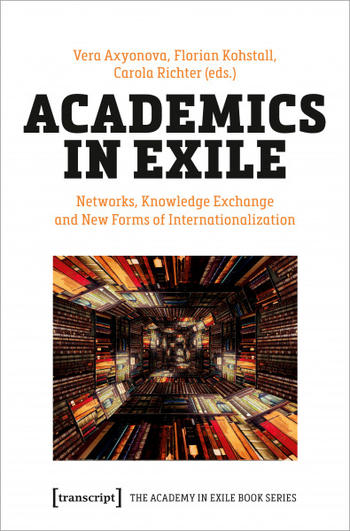Academics in Exile
Academics in exile are a specific group of forced migrants. Two research seminars have investigated their specific situation. A book project in collaboration with Vera Axyonova and Florian Kohstall from Academics in Solidarity includes their particular perspectives.
Book „Academics in Exile“ 2022
Restrictions on academic freedom, persecution and armed conflict have forced many scholars into exile. So far, the professional trajectories of these scholars and their contributions to knowledge exchange have not been studied comprehensively. The contributors to this volume address the situations and networks of scholars in exile, the challenges they face in their host countries and the opportunities they use. These issues are highly relevant to discussions about the moral economies of higher education institutions and support programs. Although the contributions largely focus on Germany as a host country, they also offer telling examples of forced mobility in the Global South, including both contemporary and historical perspectives.
Prof. Carola Richter is edited this book on „Academics in Exile - Networks, Knowledge Exchange and New Forms of Internationalization“ together with Dr. Vera Axyonova and Dr. Florian Kohstall from the initiative „Academics in Solidarity“. The book comprises of several contributions written by scholars-at-risk and other experts. It is available open access from publisher transcript's website.
_________________________________________________________________________________
Research seminar "Networks of Academics in Exile" for advanced M.A. students at Freie Universität Berlin
The transnational circulation of knowledge is an old phenomenon and scientists have been travelling the world for ages. However, many scientists do not leave their home countries voluntarily, but for reasons of repression. Political or structural circumstances force them to continue their work elsewhere. Particularly in the social sciences and humanities, this mobility can be particularly involuntary if, for example, certain ideas and the people they represent are politically or socially unacceptable. Scientists in exile can provide important impulses to academia in their host countries, however they are usually forced to make enormous adjustments - e.g. to use unfamiliar fields of expertise or to develop new networks - whereby they also have to go through identity-related adjustments.
Following a theoretical introduction to positionality, representation and identity in the context of academic exile, we will analyze the specific context of present forced mobility focusing on scientists, their motives, the institutions involved and the framework for communication and media action. Finally, we explore the method of qualitative network analysis in order to do our own empirical research on academics in exile. The goal is to gain deeper insights into the (transnational) network formations of a specific group in the light of theory and context.
On May 10th students of the seminar visited the event Real Talk: On New Beginning: Berlin's Arab Exile Body in the Green Salon of the Volksbühne Berlin to develop a deeper understanding of the concerns of intellectual exiles in Germany and especially in Berlin.
_________________________________________________________________________________
Project Winter Term 2018/2019:
Interdisciplinary research seminar for advanced M.A. students based in Berlin with a background in social sciences or the humanities
This research-oriented interdisciplinary seminar seeks to critically examine historical as well as current perceptions and discourses about academics who, due to institutional, structural or political constraints, were forced to leave their home country and seek exile elsewhere. In contrast to well-known artists or authors, exiled academics are often at the margin of inquiries into their specific situation and self-positioning. The seminar therefore strives for a deeper understanding of their specific situation and self-representation. Students will form research teams of five to seven persons and carry out their own empirical research explorations into these topics. They will be supervised by teacher tandems and have the opportunity to specialize in one of three focus areas:
Focus area 1: Focus area 2: Focus area 3:
The seminar will be structured in clearly defined work phases of preparatory blended learning (mid-May until mid-June), joint workshop sessions (in June, Oct and Dec) as well as empirical research (June until Oct; Oct until Dec). In between, the three research teams will have regular consultation sessions with their respective teacher tandems (either face-to-face or via video call).
Timeline and workshop dates:
- 21-22 June 2018 (HU Berlin): Introduction to research oriented studying & discussion of research topics
- July-October 2018: In-depth research phase for groups; regular consultations with supervising teacher tandems
- 12-13 October 2018 (FU Berlin): Discussion of preliminary results & planning for concluding symposium and exhibition
- October-December 2018: Preparation for final presentations
- 14 December 2018 (Touro College Berlin): Concluding symposium and opening of exhibition

